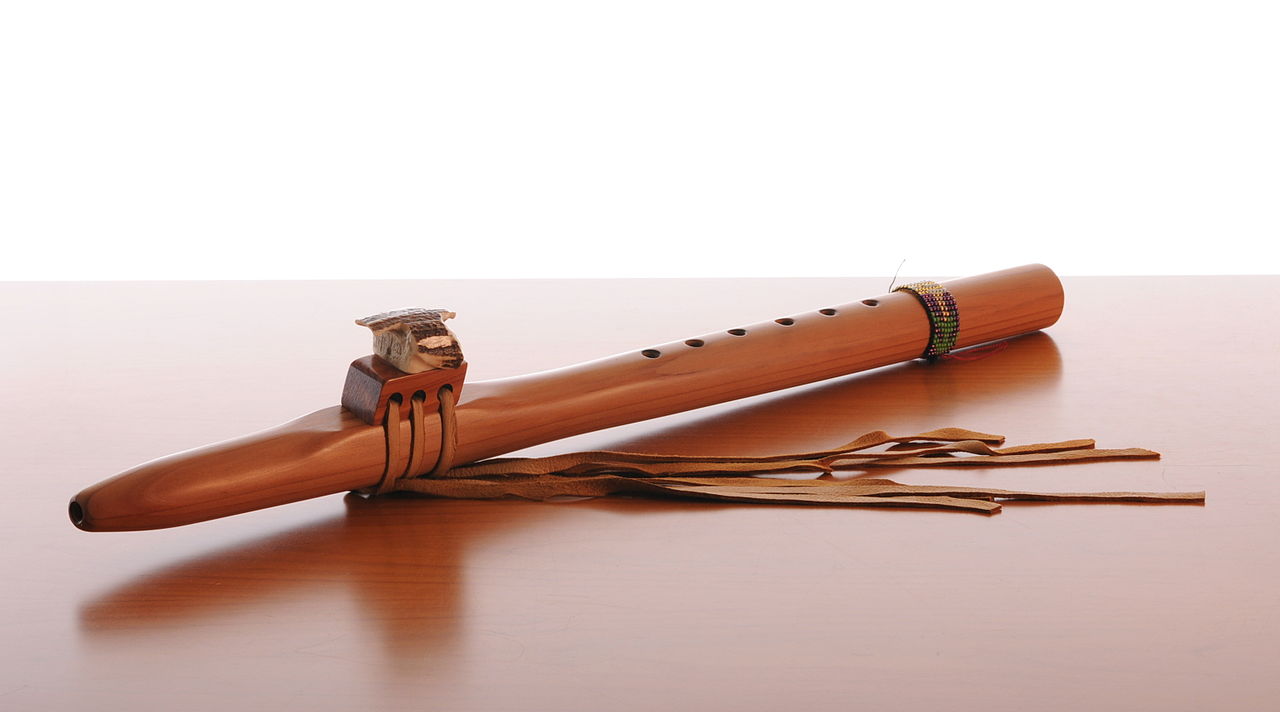
Everything is connected
For years I have enjoyed the music of a Native American flute maker and musician at events near my cottage in Maine. A member of the Chaubunagungamaug band of Nipmuck, a people indigenous to what is now southern New England, he has been composing original flute music and making flutes using only hand tools and fire for many decades. I’ve purchased his CDs and awaken to them many mornings. He has become renowned as a Native American flute player and the instruments which he crafts are, in my opinion, the Stradivarius of custom handmade flutes.
It occurred to me that I would like to own one of his flutes, perhaps to hang on my wall as a treasured reminder of his music and values. I invited him to make me a flute. After some weeks, I asked him how it was coming. He replied that he was searching for the stick that wanted to be my flute. When it came, I started to play and discovered that it takes only hours to be able to play some, but a lifetime to master. Then came the pandemic and with little to do outside of the home, I played for hours a day. I discovered a newfound love for the flute, for Native American music and culture, and best of all, it resulted in a deepening friendship with my friend who made my flute. I have come to embrace him as radiating a profoundly deep spiritual outlook on life. When he plays, he told me, it is his prayer. He said that to him, the greatest gift of the flute is its power as a tool for prayer and the healing that comes from remembering. On his website he declares:
Over time, I developed a deep sense of relationship with, and responsibility to, the flute and its power to remind us of our sacredness and our interconnection with everything in Creation. The flute’s voice calls to the Sacred in every person and aspect of Life, in ways that transcend words or normal consciousness. Everything is sacred. Every breath, word, action, thought is sacred.
Everything is sacred and all things are connected. If there is anything well-known about Native American spirituality, it is the belief that everything is connected, perhaps best explained by Chief Seattle:
Whatever befalls the earth, befalls the sons of the earth. You must teach your children that the ground beneath their feet is the ashes of our grandfathers. So that they will respect the land, tell your children that the earth is rich with the lives of our kin. Teach your children what we have taught our children, that the earth is our mother. Whatever befalls the earth, befalls the sons of the earth. If men spit upon the ground, they spit upon themselves. This we know. The earth does not belong to man; man belongs to the earth. This we know. All things are connected like the blood which unites one family. All things are connected. Whatever befalls the earth befalls the sons of the earth. Man did not weave the web of life; he is merely a strand in it. Whatever he does to the web, he does to himself.
All things are connected, he wrote, and whatever man does to the web of life, he does to himself. These are haunting words as we consider the human causes of climate change and wonder what we are doing to ourselves and to our own web. Why are we harming ourselves? Chief Seattle also notes that the earth does not belong to us. Humans are not owners, but stewards of the earth.
All things are connected, Chief Seattle once said, and whatever man does to the web of life, he does to himself. These are haunting words as we consider the human causes of climate change and wonder what we are doing to ourselves and to our own web.
Is this not the meaning of Psalm 24:1? “The earth is the Lord’s and all that is in it, the world, and those who live in it.” With just five words — the earth is the Lord’s — the Psalmist captured an entire theology of environmental stewardship. This phrase captures what is perhaps the most important apostrophe in the Bible. Lord’s. Possessive case. The earth belongs to God. This Is My Father’s World. Because God is Spirit and Spirit has no gender, you could also sing This Is My Mother’s World. The Divine possesses it. God possessed it in the past, possesses it now, and will possess the earth in the future. It is God’s. Not ours. We are its managers. We manage the earth on behalf of the one who entrusted it to us. Like my Nipmuck friend who sees the Sacred in every person and in every aspect of Life, the Psalm calls us to also see the earth and everything in it as Sacred because it belongs, not to us, but to the Divine, who created it in the first place and who entrusts it to us to care for it.
The great missionary physician Albert Schweitzer, who was also an accomplished musician and a theologian, developed a similar spirituality which he named a “reverence for life.” One of the most influential books I ever read was Schweitzer’s “Out of My Life and Thought: An Autobiography.” Schweitzer invested his life in serving the hospital-village of Lambaréné in Gabon, on the Ogowe River. His reverence for life held that “we must be benevolent, striving through our actions in the world to improve the lot of the beings around us, whether they be humans, animals or plants.”
Here is how the great humanitarian described his belief:
I call humanity to the ethic of reverence for life. This ethic makes no distinction between a more valuable life and a less valuable life, between a superior life and an inferior life. It rejects such a distinction, because accepting these differences in value between living beings basically amounts to judging them according to the greater or lesser similarity of their sensitivity to ours. But this is an entirely subjective criterion. Who among us knows what significance the other living being has for itself and for the whole? The consequence of this distinction is then the idea that there are lives without value, whose destruction or deterioration would be permitted.
Schweitzer’s friend, Albert Einstein, wrote that Schweitzer “did not preach and did not warn and did not dream that his example would be an ideal and comfort to innumerable people. He simply acted out of inner necessity.”
He simply acted. My Native American flute-making friend embraces a profound vision at seeing the Sacred in all people and in all creation. Chief Seattle got it right with his ever-so-simple phrase that “all things are connected.” Albert Schweitzer modeled a reverence for life. And in five words, the Bible says that the earth is the Lord’s. These are worthy values to inspire us as well to simply act, to go and do likewise.
Rev. John Zehring has served United Church of Christ congregations for 22 years as a pastor in Massachusetts, Rhode Island, and Maine. He is the author of more than 30 books and e-books. His most recent book from Judson Press is “Get Your Church Ready to Grow: A Guide to Building Attendance and Participation.”
The views expressed are those of the author and not necessarily those of American Baptist Home Mission Societies.



